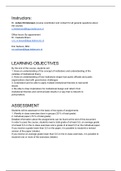Instructors:
Dr. Johan Christensen (course coordinator and contact for all general questions about
the course)
Office hours: By appointment
Dr. Caelesta Braun
Erin Sullivan, MSc
LEARNING OBJECTIVES
By the end of the course, students will:
1. Have an understanding of the concept of institutions and understanding of the
varieties of institutional theory
2. Have an understanding of how institutions shape how public officials and public
organizations deal with governance challenges
3. Understand and be able to apply multiple institutional theories to real-world
issues.
4. Be able to draw implications for institutional design and reform from
institutional theories and communicate results in a way that is relevant to
policymakers.
ASSESSMENT
Students will be assessed on the basis of two types of assignments:
1. Weekly in-class exercises done in groups (30 % of total grade)
2. Individual paper (70 % of total grade)
Detailed information about the assignments can be found at the end of this document.
In order to pass the course, students need a total grade of at least 5,5, an average grade
of at least 5,5 on the in-class exercises and a grade of at least 5,5 on the individual paper.
If you receive a grade lower than 5,5 on the paper, it is possible to resubmit a revised
version of the paper (retake).
If you receive an average grade lower than 5,5 on the in-class exercises, it is possible to
resubmit one or more of the exercises (retake).
,DEADLINES
Group exercise 1: To be submitted via Turnitin on September 11 by 23.59h.
Group exercise 2: To be submitted via Turnitin on September 18 by 23.59h.
Group exercise 3: To be submitted via Turnitin on September 25 by 23.59h.
Group exercise 4: To be submitted via Turnitin on October 2 by 23.59h.
Individual paper: To be submitted via Turnitin on October 18 by 23.59h.
Retake of group exercises – submit via Turnitin by October 30.
Retake of the individual paper – submit via Turnitin by November 22.
, Schedule
Week 1: Introduction: What is an institution?
Peters, B.G. (2019). ‘Institutionalisms old and new’, chap. 1 (pp. 1-28) in Institutional
theory in political science: the new institutionalism. Cheltenham, UK: Edward Elgar. [Pdf
available on Blackboard]
Week 2: Rational choice institutionalism
Shepsle, K. A. (2002). ‘Rational Choice Institutionalism’, in: S.A. Binder, R.A.W. Rhodes,
and B.A. Rockman (eds.) The Oxford Handbook of Political Institutions. [Available online
through Leiden Library]
Ostrom, E. (2011). ‘Background on the institutional analysis and development
framework’, Policy Studies Journal, 39(1): 7-27.
Tallberg, J. (2002). ‘Delegation to supranational institutions: why, how, and with what
consequences?’ West European Politics, 25(1): 23-46
Week 3: Historical institutionalism
Skocpol, T. & Pierson, P. (2002). ‘Historical Institutionalism in Contemporary Political
Science’, in Katznelson I. and Milner H.V., Political Science: State of the Discipline. New York:
W.W. Norton; 2002. pp. 693-721. [Pdf is available online – this version has annotations, which is
not a problem.]
Pierson, P. (2000). ‘Increasing returns, path dependence, and the study of politics’,
American Political Science Review 94(2): 251-267.
Week 4: Sociological institutionalism
March, J. & Olsen, J. (1984). ‘The New Institutionalism: Organizational Factors in Political
Life’, American Political Science Review 78(3), 734-749.
DiMaggio, P. & Powell, W. (1983). ‘The Iron Cage Revisited: Institutional Isomorphism
and Collective Rationality in Organizational Fields.’ American Sociological Review 48(2),
147-160.
Week 5: Discursive institutionalism
Schmidt, V.A., (2010). ‘Taking ideas and discourse seriously: explaining change through
discursive institutionalism as the fourth “new institutionalism”’, European Political
Science Review 2(1), 1–25.
Campbell, J.L. (2002), ‘Ideas, politics and public policy’, Annual Review of Sociology 28,
21-38.
Week 6: Putting the pieces together
Steinmo, S. (2003). ‘The evolution of policy ideas: tax policy in the 20th century’, British
Journal of Politics and International Relations 5(2), 206-236.
Week 7: Wrap-up





